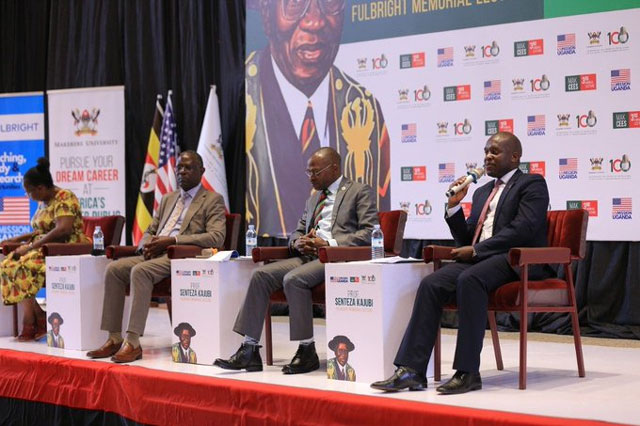
Dr Nkatta (2nd left) during a panel discussion on the life of Prof Kajubi. PHOTO MAKERERE MEDIA
Kampala, Uganda | THE INDEPENDENT | The Director General of Uganda Management Institute Dr James Nkatta has called for a redefinition of what is seen as an achievement if Uganda is to have a better education system.
According to Dr Nkatta, every person has a talent, and it is the responsibility of those who create educational policies to make sure that there are institutions and procedures in place to allow everyone to flourish in what they are best at.
Dr Nkatta, a renowned educationist and specialist in management and administration sciences in the public sector made the remarks during the third memorial lecture, in honour of Prof William Senteza Kajubi, an educationist and former Vice Chancellor of Makerere University.
His comment was sparked by concerns in the fully packed auditorium who expressed worry about how people are currently perceiving achievement and education outcomes. In acknowledgement, he noted that a more restrictive definition of achievement is prohibiting some people from realizing their potential which many times may end up being wasted.
.@USAmbUganda: “Prof. Kajubi did not limit himself to education alone; he went on to serve as a delegate to Uganda’s Constituent Assembly which created the new constitution in 1995, among other things.”#MakerereAt100 pic.twitter.com/tuFPTcitEH
— Makerere University (@Makerere) September 22, 2022
Victor Kasirye, a postgraduate student of education at Makerere University, pointed out that achievement in education is currently driven and measured by results from national examinations and as a result, schools and parents give up other aspects of education which are equally important.
The subject of whether or not exam results are an accurate measure of achievement has found itself in discussion among Ugandans quite frequently over the past couple of years. To several people, just like Kasirye, the system is currently perceiving those who cannot score high grades in examinations as stupid and many times they might not progress academically.
Nkatta noted that Uganda needs strongmen like Prof. William Senteza Kajubi to put into practice the ideas they dearly cherished and create strong institutions so that no one who goes through the educational system is wasted.
The call for redefining achievements comes at a time when the recently established Education Policy Review Commission under the chairmanship of former education minister, Nuwe Amanya Mushega, has started collecting proposals on how challenges affecting the education sector can be addressed.
The commission has been tasked with looking into and asking questions about the implementation of the recommendations in the government white paper that was created from the renowned report produced by the commission, which was led by Professor William Senteza Kajubi, in 1989.
Meanwhile, during the memorial lecture, several speakers including the US Ambassador to Uganda Natalie Brown and Makerere University council chairperson Lorna Magala showered praises on Prof. Kajubi, a man who was rightly referred to as one of the most famous educationists, and one who contributed greatly to directing the country’s education identity.
Given the fact that Kajubi was the first African to be awarded the Fulbright scholarship to study in the United States, the lecture tackles the issue of the internationalization of higher education.
Referring to how Kajubi acquired knowledge and returned to benefit his country, Dr Michael Pippenger, Vice President & Associate Provost for Internationalization at the University of Notre Dame tipped Makerere that having several memorandums of understanding doesn’t make an institution global.
“It is transparency with one another, this gives a higher chance of working and helping one another… Institutions ought to build common values to foster the Internationalization of higher education in the future. These include; Solidarity, transparency and commitment,” Dr Pippenger advised.
About Prof Kajubi the Academician
Kajubi, was remarkably an accomplished academician, administrator, consultant as well as a community leader. Upon completing his Bachelor of Arts with Diploma in Education, at Makerere University, in 1950, Kajubi enrolled on a post-graduate course, Master of Science in Geography, at the University of Chicago, and graduated in 1955.
From the 1950s, Kajubi worked for different institutions in various capacities, including, as a secondary teacher; University lecturer; Principal of Kyambogo Institute of Higher Education; Director of National Institute of Education at Makerere University; twice, as Makerere University Vice Chancellor; and Vice Chancellor of Nkumba, a private University in Uganda. In other responsibilities, Kajubi was the first chairman of the Association for Teacher Education in Africa.
In 1977, an education policy review commission was appointed under his chairmanship. However, because of the liberation war of 1977 to 1979, its report was neither officially published nor its recommendations implemented. He later led the famous Kajubi Education Review Commission of 1989 whose deliberations resulted in the 1992 Government White Paper on Education.
Among the outcomes of this commission are the many reforms that we see in the education sector such as the introduction of universal primary education, the establishment of other national universities other than Makerere University and the establishment of the National Council for Higher Education, among others.
Kajubi passed on in 2012 at the age of 85. He is survived by nine children.
****
URN
 The Independent Uganda: You get the Truth we Pay the Price
The Independent Uganda: You get the Truth we Pay the Price



Away from the academic achievements
He went an extra mile to ensure that students survived under difficult situations, a parent indeed
There was a decent meal despite intense shelling towards the “Q” huts, facilitating access to healthcare and ensuring decent burial. A boss who got physically involved